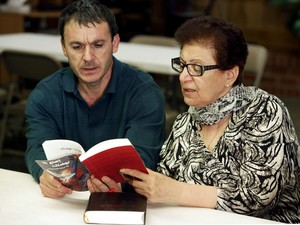Saeed Bakr thinks about his family often. Especially now, in light of recent horrific and tragic stories being told by Yazidi women and young girls, who recently escaped from the self-declared Islamic State (ISIS) where they were being held as sex slaves.
“The good news is my family were part of the 50,000 Yazidis who escaped the Sinjar Massacre (August 2014) to the mountains, eventually landing in a refugee camp in the Kurdistan region of Iraq,” says Bakr, who came to the U.S. about three years ago from the Sinjar area of Iraq. “Now they are living in a refugee camp in Turkey near the Iraqi border. Just two days ago they were in the U.S. Embassy working on getting Visas. I’m hopeful they will join me soon.”
Bakr, who is Yazidi, worships at Middle Eastern Presbyterian Fellowship in Tucson, Ariz. The fellowship began in 2008 as a Bible study of about 20 Christian Arabic speaking refugees and immigrants, primarily from Iraq. Now they have about 60 attendees from seven different countries, including Jordan, Palestine, Lebanon and Syria.
“When I came these Christians embraced me as a member of them,” says Bakr. “Yazidis and Christians in Sinjar have an old friendship, having lived together for thousand of years. But here, as victims of war, these Christians help anyone who comes from the Middle East, always.”
Bakr is thankful for all who have helped him here. Grateful for America and all its people, he prays for God to keep “them from the evil” of ISIS.
“Let me explain,” he says, “Middle Easterners, consider honor, including female chastity, as the most expensive thing in life. We Yazidis are committed to it. When ISIS invaded us—killing our men and any women who refused to bow to rape and being sold—they destroyed our honor. They broke all human and moral values.”
The Rev. George Bitar, pastor of Middle Eastern Presbyterian Fellowship, is looking forward to meeting the rest of Bakr’s family.
“Most of the six children are adults, one is a daughter, two of the sons are married,” says Bitar. “Most of them have visas. They will be here soon. His wife wants to wait until they can all come together.”
Bitar and others in the fellowship are helping Bakr search for a home where the children and their spouses can live. Even before they arrive, it feels like they are a part of this worshiping community.
“We’ve heard so much about them, and they’ve heard so much about us from Saeed,” says Bitar. “Many times he has mentioned to me how much he has learned from our church."
Bitar is encouraged to hear Bakr spreads news about Middle Eastern Presbyterian Fellowship everywhere he goes. When Bakr came here it was via a special visa for his work as a translator for the U.S. Army.
“It’s hard to put into words, the suffering he has seen, and heard from his people,” say Bitar. “He knows of what he speaks. I’m so thankful God brought him to us. It has given us a push to continue to carry on. Caring for those arrive here, who have lost so much as a result of the ongoing war in the Middle East.”

